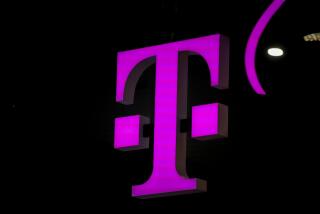FCC Approves Sprint’s Global Alliance : Telecom: Pact gives telephone monopolies of France and Germany a joint 20% stake in the U.S. long-distance provider.
- Share via
WASHINGTON — Federal regulators Friday approved a $4.2-billion investment in Sprint Corp. by the state-run phone monopolies of France and Germany, after imposing conditions on the deal meant to open the French and German phone markets.
The Federal Communication Commission’s unanimous approval brings France Telecom and Deutsche Telekom a step closer to finalizing their 20% joint stake in the third-largest U.S. provider of long-distance phone services. Together, the three hope to better compete in the global market.
The alliance, known as “Phoenix,” must still get final approval from the European Community, which is expected next year. Sprint shareholders are scheduled to vote on it Jan. 12.
The FCC, which found that the French and German phone markets are not open to outside competition, imposed curbs on the alliance that may limit the venture initially.
France and Germany have pledged to fully liberalize their markets for telecommunications services and equipment by 1998, and the restrictions are meant to hasten that process.
For example, Sprint will be barred from activating new phone lines to France and Germany until both nations meet pledges to begin liberalization.
Sprint must report to the FCC on the progress of liberalization, putting the agency in a position to revoke Sprint’s powers and rights if progress is lacking.
Sprint said the conditions would not hinder its planned services.
“We have significant capacity already reserved to Europe,” said Sprint senior vice president John Hoffman. “We are in good shape for the short run.”
Sprint also must jump through added regulatory hoops on such matters as tariff filings and the addition or deletion of phone lines on routes to Germany and France from this country.
While the FCC said the German and French markets are not open, it decided the deal was in the “public interest” in part because it could usher in lower phone rates in this country.
More to Read
Inside the business of entertainment
The Wide Shot brings you news, analysis and insights on everything from streaming wars to production — and what it all means for the future.
You may occasionally receive promotional content from the Los Angeles Times.










